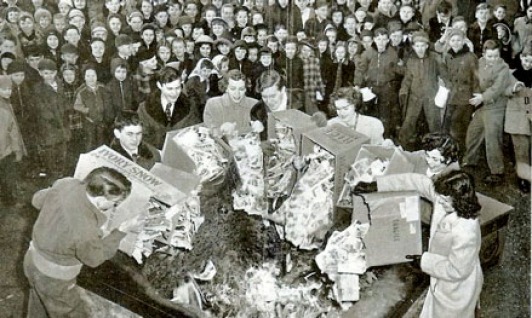A History of Comics and Early Literacy
American anti-comics sentiment

A 1948 comic-book burning in Binghamton, New York (from Hadju, 2008)
Historically, the role of comics in American education was profoundly effected by anti-comics sentiment which held that comic books were a form of children's literature that was detrimental to the literacy learning and mental health. As Yang (2003) notes, the popularity of comic books among children beginning in the mid 1930s initiated "...over a decade of debate, research, and writing on the educational value of comic books."
Because the widespread negative view of the educational and literary merits of comics during this time period framed research into comics and literacy education, the first two sections of this topic provide brief overviews of anti-comics sentiment in the 1940s and 1950s. The third section of this topic provides some information on academic research on comics and education during this time period. A major portion of this research generally concluded comic books could have a positive effect on young people's reading habits overall, but almost always from the perspective that they could be used to move readers onto "better" (i.e. prose) books.
Because the widespread negative view of the educational and literary merits of comics during this time period framed research into comics and literacy education, the first two sections of this topic provide brief overviews of anti-comics sentiment in the 1940s and 1950s. The third section of this topic provides some information on academic research on comics and education during this time period. A major portion of this research generally concluded comic books could have a positive effect on young people's reading habits overall, but almost always from the perspective that they could be used to move readers onto "better" (i.e. prose) books.
